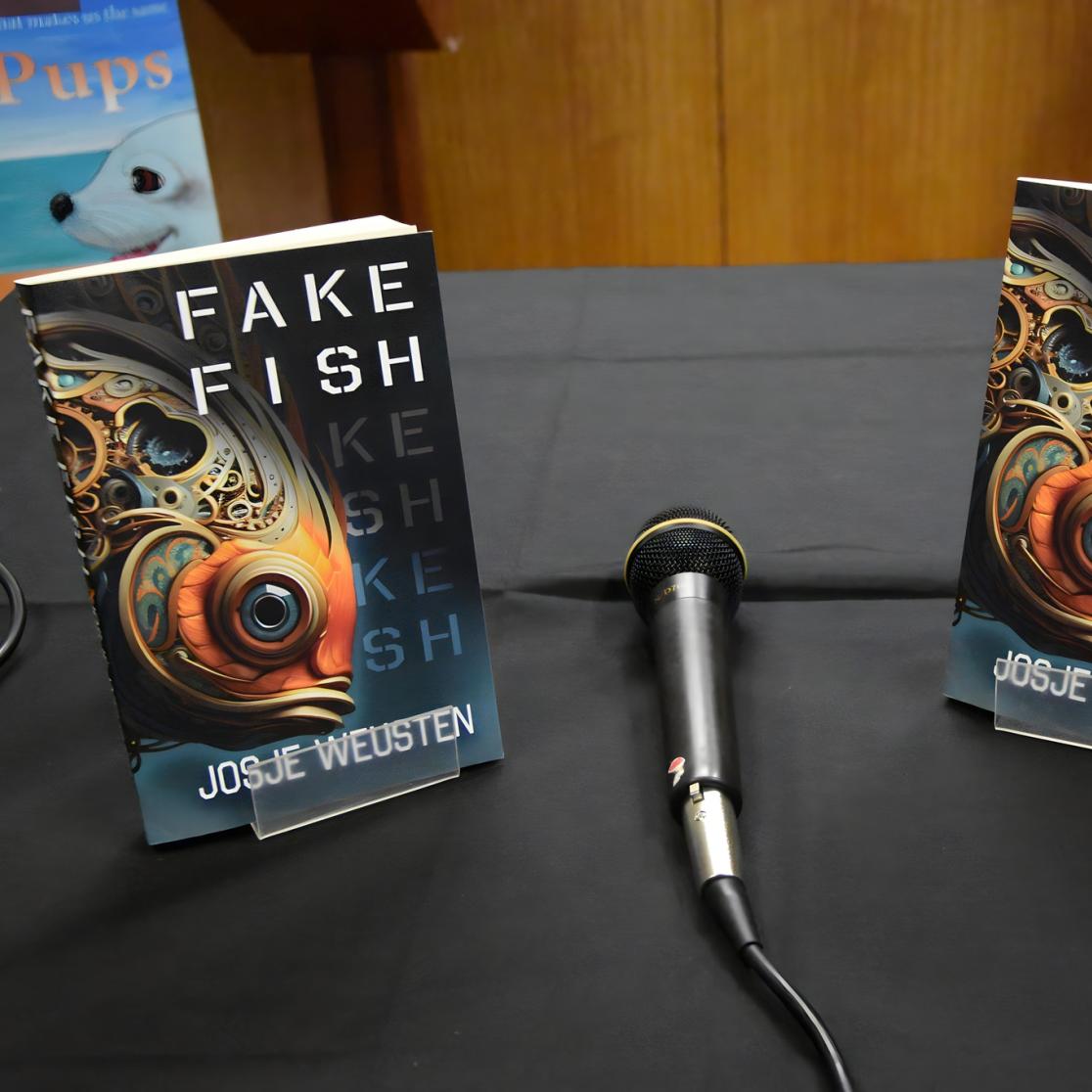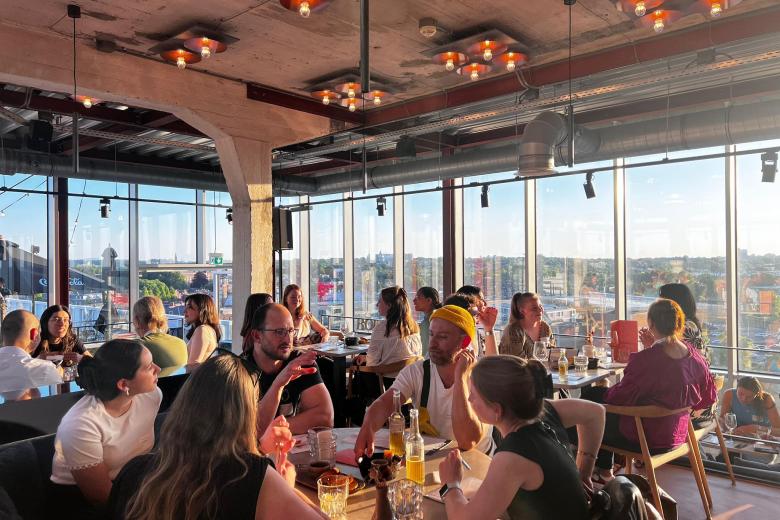Alumna Josje Weusten: Successfully embracing creative writing
In the series ‘From Alumnus to Author’, we shine a spotlight on UM alumni who share their knowledge and experiences through books. This time, we take a slightly different angle: alumna Josje Weusten published her first novel, Fake Fish, in 2024 and shares her insights and knowledge on creative writing.
For those who know Josje, it’s no surprise she has become a writer. She has been writing her entire life and has even participated in various writing competitions. However, during her studies and PhD in literature, academic writing took precedence, and creative writing moved to the background.
Yet, the urge to write fiction never left Josje. She only needed a small “push” to take real action, which she received from those around her, like her department head and colleagues. “They encouraged me to share my work with others, as they believed it was too good to keep to myself. You always have some self-doubt, but thanks to them, I dared to take the plunge. I am very grateful to them for that.”
Josje’s path to publication
In 2021, Josje began writing her dystopian novel, Fake Fish. The first 10,000 words came quickly. To further develop her writing skills, Josje decided to enrol at the Faber Academy in London in 2022. This academy offers various writing courses and programmes, and admission to their advanced programme is competitive. They select a maximum of 15 participants based on submitted manuscripts. Josje was accepted as the only non-native speaker and spent an academic year completing the first draft of her novel.
Four months later, she found a publisher eager to publish her manuscript: Sparsile Books, a British literary publisher that was named Scotland’s best publisher this year. “I was very fortunate with Sparsile Books. They immediately understood the story I wanted to tell, and they focus on innovative, genre-blurring literature. That’s exactly the type of book I wanted to write. The novel explores fake news and AI and how they increasingly undermine our concepts of what’s real and what isn’t. I wondered what effect this would have on universities, where truth and factuality are central values. My work as a lecturer at UM’s Faculty of Arts and Social Sciences was a key source of inspiration. Readers will certainly recognise the settings described, but the book remains fiction. It’s not a roman à clef,” Josje explains. “It’s a novel set in the near future—dystopian, satirical, cinematic, but also literary. My publisher describes it as a blend of Margaret Atwood and Quentin Tarantino, and I think that captures it well.”
I didn’t start writing with the idea that I absolutely had to publish it. The most important thing, I think, is to write for yourself first and foremost, because you enjoy it and find it fulfilling.
After several rounds of editing and revisions, the book has been available in bookshops across Britain and the rest of Europe since 14 November 2024. “The story centres around a video in which a professor makes misogynistic remarks. The video goes viral, but it’s unclear whether the clip is genuine or a deepfake. How do the people around him respond? How can they take responsibility when they’re no longer certain what to believe? As the novel progresses, these questions start to arise on a larger scale. While the main characters grapple with the ‘news’ about the professor, they fail to realise that their society is increasingly destabilised by fake news until, finally, the EU collapses.”
A book that prompts reflection and discussion
Although Josje’s dystopian novel is fiction, it addresses several issues that resonate with those we see in today’s society. For this reason, the book comes with a discussion guide, intended to encourage readers to think about real societal issues.
Josje explains why she chose to include a discussion guide: “I saw a discussion guide in another book and thought it was an interesting concept because it invites readers to take another look at the book, seeing it in a new light. It’s also a tribute to my students, without whom this book would never have existed. The constructive discussions with them about literature certainly influenced my writing process.”
The goal of the discussion guide for Fake Fish is to encourage readers to examine important issues from multiple perspectives. “One of the problems the book touches on is how people are increasingly trapped in their own information bubbles. With the discussion guide and the book, I hope to inspire readers to consider things from different angles. But aside from being a thought-provoking story, I mostly hope people find it an engaging book that they struggle to put down.”
Text continues below the photo.

Knowledge sharing: creative writing
Would you like to start writing your own fiction book, or is it your dream to publish one? Josje shares a few tips to help you begin. The first is to read a lot: “Not just for enjoyment, but with a writer’s perspective. That means reading very consciously and asking yourself what you like about a story and why. How is it put together? How is dialogue constructed, for example, or how is a certain rhythm created in the story?” Gaining insight into these aspects can help you play with them more deliberately, improving your own writing skills.
She also encourages simply starting and writing regularly. “There’s a saying that you should write every day. I can’t manage that, even though I’d love to, but I have another job, a family, and a busy social life. I do try to write as regularly as possible, partly because I enjoy it so much, but also because it ultimately improves my work.”
Josje also suggests joining a group of aspiring writers nearby and sharing your work with others, especially since courses can often be expensive. If you want to publish in English, she recommends The Writers’ & Artists’ Yearbook by Bloomsbury Press, an annual guide listing publishers and magazines with details on how to submit work and what they publish. It’s also useful to visit the website Authors Publish or follow them on Instagram. They regularly post lists of journals that pay for submissions and accept work at that moment, alongside helpful articles about the writing process.
Future plans of author Josje
While Josje awaited the publication of her first book, she began working on several short stories that were published in international literary magazines. She was also nominated for the Best Small Fictions award by Altcurrent Press, and due to her creative achievements, she was featured in the exhibition and book Parkstad Prima Donna’s, highlighting 101 remarkable women from the Parkstad region. Currently, she’s working on a collection of autofictional stories—a genre that blends autobiography with fiction by weaving elements of real life with imagination. At the same time, she has started her second novel, a dystopian story about ageing. She doesn’t want to reveal too much about it yet: “Besides, I don’t even know exactly how the story will look in detail, only the broad outline, but even that could still change along the way. I actually like that. I want to be surprised myself as well.”
There must be a certain challenge in it. It shouldn’t be that I know exactly how everything will unfold from the start—I want to be surprised myself as well.
Further reading
Would you like to delve into creative writing and read some great example books? Here are Josje’s current favourite authors:
Kazuo Ishiguro, Nobel Prize winner, known for Remains of the Day, Klara and the Sun, and Never Let Me Go.
- “A fantastic writer due to his clean, sparse style. He’s very skilled at suggesting things between the lines—he doesn’t say it directly, but in an indirect way; it’s really impressive.”
- Margaret Atwood, known for The Handmaid’s Tale and The Testaments.
- “What I’ve taken from her is that she never writes about anything that hasn’t already happened somewhere in the world. This way, no one can accuse her of having a ‘vile mind’. Atwood also forces us to critically examine our own society. Speculative novels often say more about our time than about the future.”
John Maxwell Coetzee, known for Disgrace.
- “Also a Nobel Prize winner. One of his best books is Disgrace, about a professor who is dismissed from the university due to inappropriate behaviour. He then travels through South Africa on his way to visit his daughter, struggling with the changes in South Africa after apartheid. This book has certainly been an inspiration for me as well.”

Text: Janneke Haemers
Photography: Peter O’Rourk
Also read
-
Recap: UM Connect Day 2025
On Saturday 27 September 2025, around 150 Maastricht University alumni returned to Maastricht for the annual UM Connect Day. This year’s edition, held at the School of Business and Economics, centred on the theme technology and innovation. Alumni came together to exchange knowledge, strengthen...

-
The sugar cubes behind your ears
UM alumnus Ağali Mert combines his adventurous career and fascination with the inner ear in 'Over de Kop', sharing insights and debunking myths about dizziness.
-
Behind the Scenes of a Coaching Debut
A new role, fresh encounters, and heartfelt conversations: five alumni recently took their first steps as coaches during the UM Coach Café. In an evening full of inspiration and connection, Erica, Gerla, Loes, Marike, and Mike discovered what it means to support students and alumni in their career...
